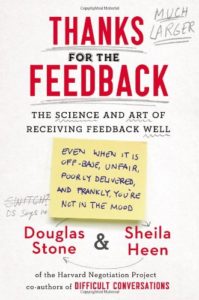Receiving Feedback Well is about how we reflect and then react or respond when we find ourselves on the receiving end of feedback.
Feedback can include information that is communicated to you about yourself such as:
- your annual performance review
- a 360 leadership feedback process you participate in as part of your development
- recognition and praise you receive for a job well done
- critique you receive about developmental areas
- how the face of your grandchild lights up when she sees you
- continual and sustaining renewal for your services from a long time client
- and even what your sore knee is telling you today!
Feedback is the breakfast of champions
– Ken Blanchard
Feedback can be formal or informal, direct or indirect, and positive or constructive. It how we manage our own initial resistance or reaction to the feedback that leads to our reaction. We can react with closure and defensiveness, or we can choose to be open and respond to the feedback, cultivating humility and curiosity, listening deeply to understand, and searching for the “gift” in the message, regardless of how that message was delivered.
Why is it sometimes difficult?
Douglas Stone and Sheila Heen in their book Thanks for the Feedback: The Science and Art of Receiving Feedback Well offer that receiving feedback sits at the intersection of two needs – the need to learn and improve and the need to be accepted for who we are.

For leaders, lifelong learning is a master skill and capacity, and a healthy self-regard is a hallmark of high emotional intelligence. Self regard is being comfortable with our strengths and our developmental areas, knowing that we will be working on ourselves and our leadership development the rest of our lives!
Stone and Heen suggest the need to separate feedback into three categories:
- Appreciation: Receiving thanks and recognition and praise for accomplishments and behaviors which encourages the heart.
- Developmental: Receiving ideas, suggestions, and constructive critique on how to grow our skills, capacities, and knowledge, and increase our value to ourselves, Others, and the organization.
- Evaluation: Ratings about our performance that suggests to you where you stand at this moment and how good you are at aligning your behaviors to expectations and standards.
As a facilitator and coach of leadership development, I have been asking leaders in my programs: “What helps you receive leadership developmental feedback well?” Here is a sampling of their responses:
- When the person giving me feedback has really done their homework and is well prepared, and has made their intention to help me be successfully explicit.
- When feedback is direct, honest, and balanced with both positive feedback and constructive feedback. There is something I can do about it, and suggestions and support on how to do it. It is delivered respectfully, and ideally there is an opportunity for a face-to-face or voice-to-voice conversation.
- I am open minded, non-defensive, and look for the message in the feedback.
- By cultivating a growth mindset and valuing the feedback and opportunity to grow by asking myself: “What can I learn from this?”
- When I have time to reflect on the feedback and engage with the feedback.
- When I can follow-up and have further conversations.
- Asking for clarity, requesting: “tell me more…” asking for specific examples, requesting coaching and mentoring.
What are the benefits of receiving feedback well?
Benefits include growing your self awareness and self knowledge, expanding knowledge and new skills development, developing a healthy self regard along the way, and enriching your relationships through open honest transparent communication built upon trusting relationships, where we are helping one another be successful.
Receiving feedback well is about reflecting on the feedback, engaging in conversations skillfully, exploring what you are learning, and then making thoughtful choices about whether and how to use the information and responding positively. It is about managing your emotional triggers if feedback is difficult to take in, so that you can listen to what the other person is telling you and you are open to seeing yourself in new ways.
What helps you receive feedback well? What benefits are you experiencing? Please leave us a comment below or email info@womeninleadershipforlife.ca.
And if this blog interests you, please check out a companion blog Linda recently wrote “The Potential of Leadership Feedback: The Why and the Ways.”
Lillas Hatala
March 25, 2016
2 thoughts on “Receiving Feedback Well”